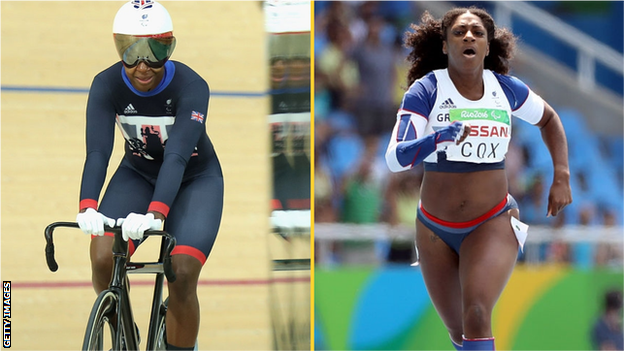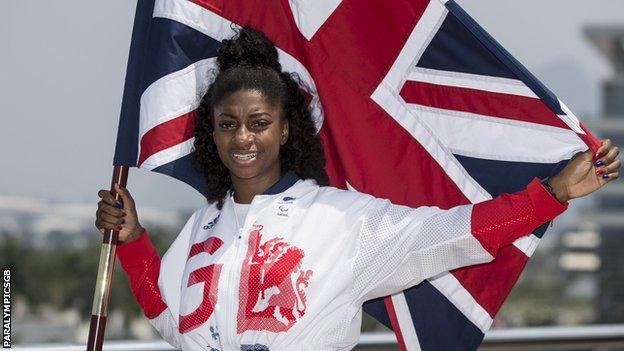Tokyo Paralympics: Kadeena Cox on challenges of defending titles in two sports
- Published

In Rio, Cox became the first British athlete in 28 years to win gold in two sports at the same Paralympic Games
Paralympic Games on the BBC |
|---|
Venue: Tokyo, Japan Dates: 24 August-5 September Time in Tokyo: BST +8 |
Coverage: Follow on Radio 5 Live and on the BBC Sport website |
Double Paralympic gold medallist Kadeena Cox says that repeating her Rio heroics in Tokyo will be tough.
Cox won gold in cycling and athletics at the 2016 Games and carried the GB flag at the closing ceremony.
The pandemic, injuries and her multiple sclerosis have challenged Cox before the Games, which start on Tuesday.
"I am in a great place with my cycling. With athletics, I haven't had as much running as I would have liked," she told BBC Sport.
"But I'm hoping it comes together at the right moment."I'm excited to go there and do the two things I love and hopefully show the world what I've got."
The 30-year-old will start her busy programme on Friday, 27 August when she defends her C4-5 500m time trial title before linking up with team-mates Jody Cundy and Jaco van Gass for the mixed team sprint event the following day.
She will then switch attention to athletics and bid to retain her T38 400m crown in a straight final on Saturday, 4 September.
While athletics has been part of her life for many years, her MS diagnosis in 2014 led to a journey into Para-sport which has not only yielded global medals but also television appearances on The Jump, Great Celebrity Bake Off, Robot Wars, Celebrity MasterChef and Celebrity Gogglebox.
However, there have been downs since Rio - a knee injury has caused her issues over the past few years, she was sidelined for 11 weeks last year with concussion and she has spoken openly about dealing with disordered eating.

Cox wants to make the most of her second Paralympics
And a busy schedule which sees her travel between the Manchester Velodrome, athletics training in Loughborough and family in Leeds does take its toll.
"I spend a lot of time thinking and worrying about fatigue. It is the thing I struggle with the most," she said.
"I have to miss some sessions because my spasms make it unsafe for me to be on a bike. There are times when I'm on the athletics track when I can't control my movement or I'm not able to maintain my hip stability and I am wobbling all over the place.
"It can be frustrating but we work on ways to manage it and I get the rest when I need to.
"The way I am now after races is a lot worse to what it was in Rio. I put everything in and recovering is a challenge. I get really bad spasms and the test in Tokyo will be to try to recover from that, and the race itself, and then go out and perform again the next day.
"I never push myself to that point in training because I am scared of not being able to recover."
While athletics has always been in her background, it is in cycling where Cox has grown most as a sportswoman over the past five years. As well as her own development, she is looking at bringing on the next generation of cyclists through her KC Academy which aims to have greater diversity in elite cycling.
"I think I can now call myself a cyclist. I definitely wasn't a cyclist in Rio," she laughed.
"In 2016 I was fresh and raw and it was grit and determination which got me to the gold medal. Nobody really knew me and what I was capable of.
"Now I have far more technical abilities which I hope will help me in Tokyo. Before Rio, I had never been at the top of the velodrome track but now I train from the top of the track.
"I understand the track far more and am more confident in my abilities and I know the bike better now.
"It puts me in a different position - I think I feel more pressure. But now I am a cyclist who people know and the expectation is there. I am more nervous but I am also excited."

"My body's tired... but my mind is racing": Why are thousands of young people struggling to sleep?
The Merthyr Mermaid: Follow Cath Pendleton as she prepares to swim a mile in Antartica
